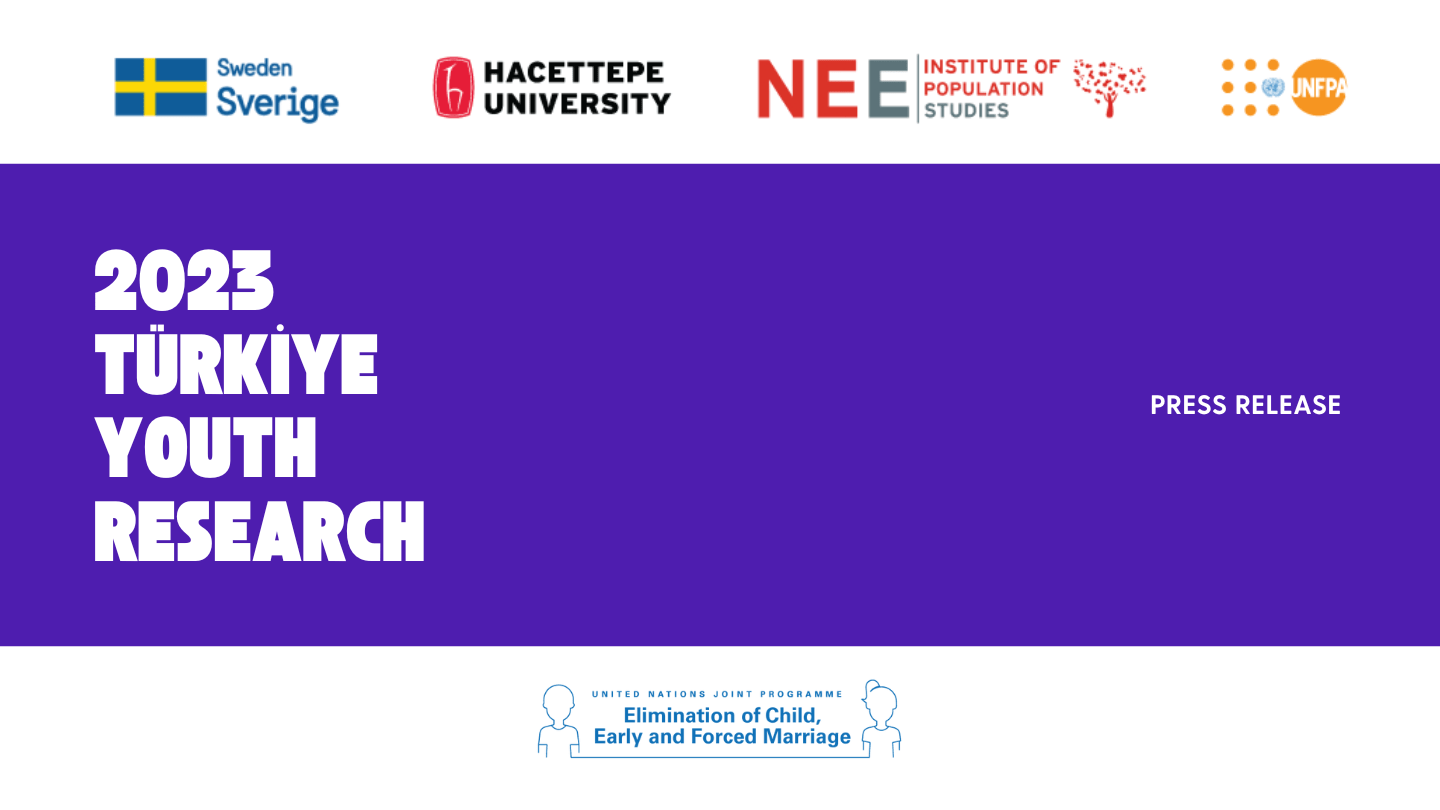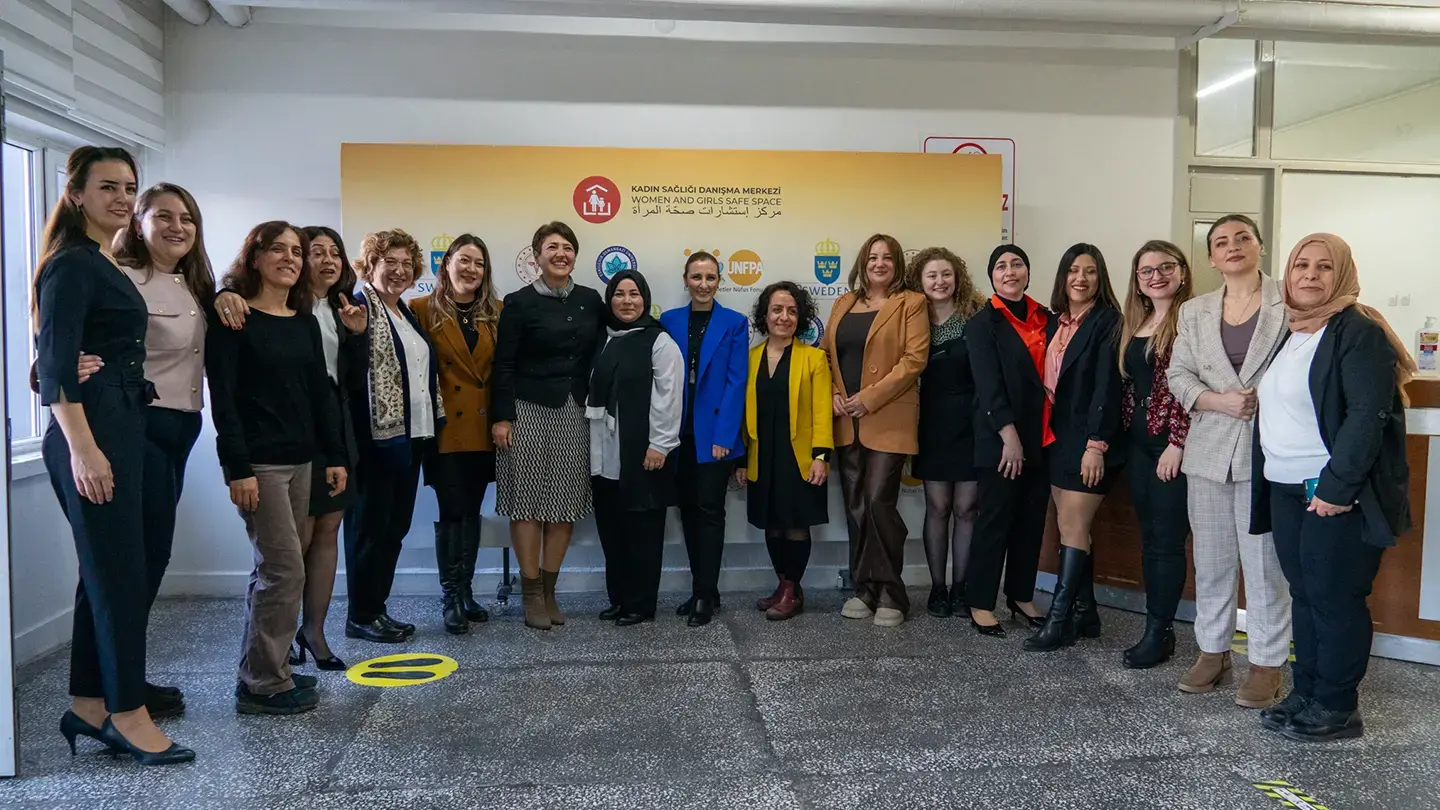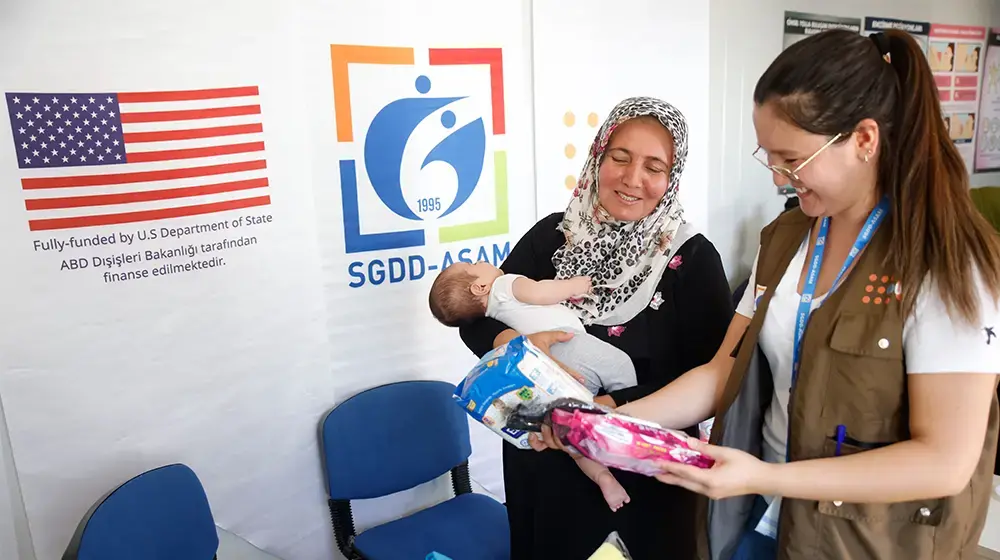The results of the 2023 Türkiye Youth Research (TGA-2023), conducted jointly by the United Nations Population Fund (UNFPA) and Hacettepe University Institute of Population Studies (HÜNEE) with the financial support of Sweden, have been announced. The research, which examined the knowledge levels, unmet information and counseling needs, and their reflections on behaviors of young people aged 15-24 in Türkiye from their childhood to the end of adolescence, has revealed significant data, particularly regarding sexual and reproductive health and child marriage.
December 17, 2024
Ankara, Türkiye - Youth, the transitional period from childhood to adulthood, is a significant stage in a person's life marked by rapid biological, psychological, and social development, as well as the shaping of one's identity and values. The 2023 Türkiye Youth Research (TGA-2023), conducted jointly by the United Nations Population Fund (UNFPA) and Hacettepe University Institute of Population Studies (HÜNEE) with the financial support of Sweden, has been completed. The findings of the report were shared with the public at a launch event held on December 17 at Hacettepe University's Beytepe campus.
The research reached approximately 1,300 young people aged 15-24 from nearly 3,000 households in 67 provinces across Türkiye, representing diverse living conditions. The study collected valuable data on the demographics, living environments, education and employment status, sexual and reproductive health, and views on child marriage of these young individuals.
The research has made significant contributions by providing data to support the development of youth-friendly policies and practices aimed at improving access to sexual and reproductive health information and services, as well as preventing child, early, and forced marriages. It has also supported awareness-raising and advocacy efforts in this field.
The qualitative and quantitative findings of the research have been compiled into two separate booklets. For key findings of the qualitative and quantitative research, please click here. To access the full quantitative research report, please click here. To access the full qualitative research report, please click here. Key findings from the reports are presented below.
ACCORDING TO QUANTITATIVE FINDINGS;
Demographic Profiles and Living Conditions
- 14% of the households participating in the survey are in the 15-24 age group.
- At 1 in every 3 households, there is at least one young person (33%).
- Nearly half of the young people do not have a room of their own at home(44%).
Education Status
- One in five young people have a middle school education or less (17%).
- 37% are high school students, 23% are high school graduates, and 23% are university students or graduates.
- One-third of high school-level young people (31%) report dropping out of school due to their family's financial difficulties or the need to work.
- Compared to the 2007 Türkiye Youth Survey, the proportion of young people who are university students or graduates has increased from 2% to 22% among men, and from 4% to 24% among women.
Employment Status
- Almost half of young people are employed (42%), but only half of them have social security (46%).
- 14% of unemployed young people are actively seeking employment.
- The employment rate is 3 out of 5 (61%) for young men and 1 out of 4 (24%) for young women.
- One in five young people (20%) is neither in education, nor in employment, nor training (NEET). As a reflection of gender inequality, this rate increases to 1 in 3 (29%) for women and drops to 1 in 10 (10%) for men.
Social Media Use
- 92% of young people use social media. Instagram is the most preferred platform (88%), followed by TikTok (31%) and X (28%).
- 88% of young people obtain information about violence against women, 69% about sexual and reproductive health, 64% about child marriage, and 61% about youth and violence from social media.
Sexual and Reproductive Health
- Young people, especially the ones aged 15-19, living in rural areas, with low levels of education and from poor households, have a very low level of knowledge about the physical, psychological and sexual changes that occur during adolescence.
- One in five young people cannot identify any female or male reproductive organs. Only 41% of young people know that the uterus is the organ where a baby grows.
- The proportion of young people aware of sexually transmitted infections (STIs) decreased from 84% in 2007 to 53% in 2023. The proportion of young people who consider HIV/AIDS to be an STI also decreased from 80% to 30%.
- More than half of young people (55%) have never heard of HIV.
- The HPV vaccination rate, which provides nearly complete protection against cervical cancer, is only 2%. 53% of young people stated they would be willing to receive the HPV vaccine if it were free of charge.
- 97% of young women reported using sanitary pads during menstruation, while approximately 17% expressed concern about not being able to afford more menstrual supplies if they run out, indicating period poverty.
Marriage and Attitudes Towards Child Marriages
- 90% of young people have never been married, 9% are married, and 1% are divorced or living separated. According to the 2007 survey, it appears that the proportion of married young people has significantly decreased.
- A quarter of young women aged 15-24 who are married were married as children (27%).
- The average age of first marriage is 19 for women and 25 for men.
- Between 2007 and 2023, the average ideal age for the first marriage increased from 23.4 to 24.6 for men, and from 22.2 to 24.3 for women.
- 5% of young people are unaware that both men and women must be 18 years old to marry by their own consent, and 28% are unaware that polygamy (men marrying more than one wife) is illegal.
- 8% of young people agree with the statement "A woman reaching puberty means she is ready for marriage" 10% agree with the statement "If a woman has a boyfriend, she should marry the person she is dating" and 62% agree with the statement "Women should not have sexual experience before marriage."
The view of young people on child marriages is as follows;
- 86% agree that "Those who marry before the age of 18 will drop out of school."
- 91% agree that "This type of marriage causes psychological problems."
- 75% agree that "It increases the risk of domestic violence."
- 86% agree that "Those who marry as children lack knowledge about healthy sexual relationships."
- 81% agree that "Becoming a mother before the age of 18 negatively impacts both the mother's and the baby's health."
ACCORDING TO QUALITATIVE RESEARCH FINDINGS:
Education: The findings show that young people's expectations from education are decreasing. They think that schools do not adequately support creativity and that diplomas are insufficient for finding employment. The belief that education will create insufficient opportunities encourages, particularly boys, to enter the workforce early. Encounters in some schools such as limited teacher-student interaction, peer bullying, violence and harassment can also lead to students dropping out of school.
Child marriages: In families where girls' education is not supported, where women are seen as responsible for the housework and care labour, and where their works in paid employment is not viewed favorably, marriage is seen as the only option for girls.
Furthermore, restrictions on social life, the burden of household chores on girls, lack of attention and communication within the family, and domestic violence can also lead to marriage being perceived as an escape route for girls. The romanticization of marriage in the media, including social media, also contributes to this perception.
Society's approach to sexuality also plays a role in influencing child marriages. Parents' fears and anxieties about their children engaging in any risky relationships or behaviors before marriage can pave the way for such marriages under the guise of "protection."
Sexual and reproductive health: Regarding sexual and reproductive health, young people exhibit a significant lack of knowledge. Parents' inability to openly discuss adolescent health, development, and sexual and reproductive health with their children, the lack of environments where children and young people can comfortably discuss these issues, and the limited inclusion of adolescent health in the curriculum all contribute to a lack of knowledge in these areas.
2023 TÜRKİYE YOUTH RESEARCH RESULTS AND RECOMMENDATIONS:
The research results generally show that young people's knowledge about adolescent health has not increased as expected compared to a study conducted 16 years ago, and in some cases, it has even decreased. The findings indicate that young people, especially in the areas of sexual health, reproductive health, and child marriage, have serious knowledge gaps and face various health and safety risks. Moreover, the research results highlight the reflections of gender inequality in many issues affecting young women and men.
In this context, it is critically important to increase education and awareness efforts with the contributions of all stakeholders, including all relevant public institutions and local governments, as well as civil society and the private sector, especially the Ministries of Health, National Education, and Youth and Sports, considering young people's demand for information through schools, health personnel, and social media in order to address the knowledge gaps and misconceptions among young people. Additionally, the need arises to strengthen youth-friendly policies and services, particularly specialized youth-friendly health services, and to develop youth-focused policies and programs that will empower young people for equal rights and opportunities in all areas.




